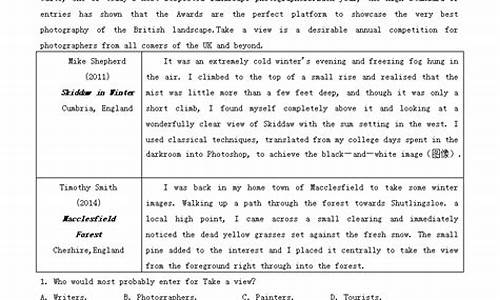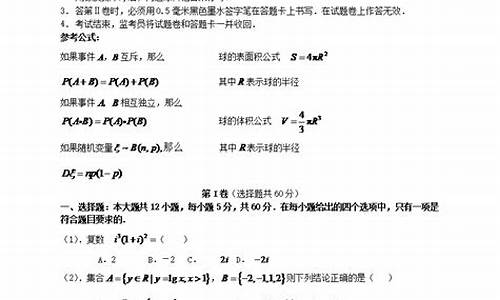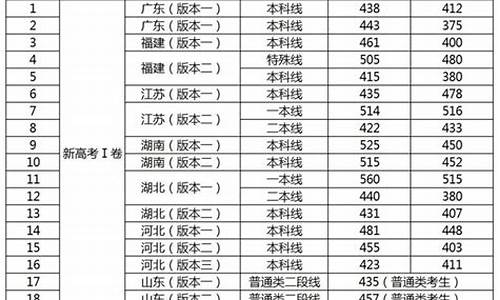您现在的位置是: 首页 > 志愿填报 志愿填报
2017新课标英语高考_2017高考英语新课标卷2答案解析
tamoadmin 2024-07-02 人已围观
简介1.2017高考英语语法填空分类试题2.2017高考英语动词不定式专项知识点3.听说2017英语不参加高考4.2017年湖南高考英语单科满分多少分5.2017年新高考的科目及分值是多少?6.2017年高考英语全国卷1 - 阅读理解B 2017年高考英语3500词解析版C 1.●calculate v. 计算, 核算 It has been calculated that ? e
1.2017高考英语语法填空分类试题
2.2017高考英语动词不定式专项知识点
3.听说2017英语不参加高考
4.2017年湖南高考英语单科满分多少分
5.2017年新高考的科目及分值是多少?
6.2017年高考英语全国卷1 - 阅读理解B

2017年高考英语3500词解析版C
1.●calculate v. 计算, 核算 It has been calculated that ?
eg. It has been calculated that at least 47000 jobs were lost last year.
(be) calculated to do sth. eg. The speech was calculated to win votes.
2. call v. 叫;喊;打电话 a girl called Mary a girl calling herself Mary
call on call at sp. call for call up call off call in
3. calm adj. 镇静的、沉着的 calm down v.使镇静 keep calm
4. camp n.营 v.野营;宿营 summer camp 夏令营 go camping 去野营
5. can 否定:cannot= can?t
can?t help doing = can?t help but do 禁不住
can not?too? = can never?too? 越?越好/再?也不为过
You can never be too careful when crossing the street.
6. care n. 照料;保管 take care of 照顾、保管 take care (that)?当心
v. 在乎;介意 I don?t care. 我不在乎/我不放在心上。
care for 喜欢;照顾 care about 关心;在乎
7. careful adj. 仔细的;小心的 be careful of? 当心,小心 listen carefully
8. carry v. 拿;搬;运;背 carry on 继续、进行 carry out 实施、执行
9. case n. 情况;案件;病例 in case +句子/in case of +名词 万一
in this/that case 如果这样/那样的话 in no case 绝不
as is often the case 事实往往如此 eg: As is often the case, women live longer than man.
10. ◎cash n. 现金 pay in cash /by check vt. 兑现 ~ a check
cash in on?从...获得利润 The shop are cashing in on temporary shortage by raising prices.
11.●cast v. 扔,抛,撒
cast your net wide cast about/ around for sth cast sb./ sth out
cast sb./ sth aside be cast away be cast down cast sth off
12. catch?caught?caught catch up with 赶上
catch sight of 看见 catch sb. doing 撞见/捉住某人做某事
catch one?s eye= attract one?s attention 引起某人注意;引人注目
13.●cater v. 提供(承办)酒席,满足需求
cater for sth/sb : The class caters for all ability ranges.
cater to sth/ sb: It catered for all tastes.
14. cattle n. 牛(总称)单复同形 The cattle are in the shed. 牛在牛棚里。
15. cause n. 原因、起因 cause and effect 因果
the cause of fire/cancer 火灾/癌症的起因
v. 引起;促使 The storm left, ____ a lot of damage to this area.
16. ◎cautious adj. 谨慎的 小心的 be cautious of/ about...
caution n. 谨慎 小心 with caution 小心地
vt. 警告...小心... caution sb. to do caution sb. against... 警告某人警惕 We were cautioned not to drive too fast.
17. celebrate v. 庆祝 celebrate one?s birthday celebrate Christmas
18.◎central adj. 中心的,中央的 central bank/
1) 主要的,首要的 play a central role in? 在?起着主导作用。
centre n. in the centre of the room
v. centre on /upon/ round /around?把?当中心 使?成为中心
19.◎ceremony n. 典礼,仪式 1) attend a wedding ceremony
2) stand on ceremony 拘于礼节 without ceremony 粗鲁无礼,不拘礼节
20. certain adj. 确定的;无疑的 certainly adv.
be certain of= be sure of 对?确信的' be certain to do =be sure to do 一定会、必然
make sure/certain of? 保证、弄清楚 * It is certain that?
21.◎challenge face/ take up a challenge 面对/接收挑战
challenging adj 具有挑战性的 a challenging job
22. chance n. 机会;可能性 give sb. a chance 给?一次机会;
take a chance/chances 冒险;碰运气 by chance/accident 偶然;
There is a/no chance that? 有可能/不可能?
23. change v. 改变、变化; n. 变化;零钱(不可数)
change?into? 把变成; change one?s mind 改变主意
Great changes have taken place in China. Do you have any change on/with you ?
24.●characteristic adj. 独特的 n. 特征 特点 a key characteristic of?
25. charge n./vt charge?for? 收/要价多少;
charge sb. with sth/doing 指控某人做了 get the phone charged 手机被充电;
The soldiers were charging forward bravely.战士们勇敢地向前冲。
take charge of 负责、管理 in charge of 负责;
in the charge of 被/由? 负责; free of charge 免费
26. chat v./n. 聊天;闲谈 chat?chatted?chatted?chatting
have a chat with sb. 与某人聊天; chat room 聊天室
27. check v./ n. 检查;核对;批改; 支票 by check 用支票支付
辨析: check examine
check 指核对某事物是否正确, examine 表检查、调查、审查等
check the answers check the mailbox 核实邮箱(看有没有信)
examine your body/eyes examine the machine
28. cheer n./vi. 欢呼;喝彩A great cheer went up from the crowd.
cheer sb on 为某人加油 cheer up 振作起来;高兴起来 Cheers ! 共同举杯
29. ◎cheerful adj 兴高采烈的,高兴地 a cheerful smile
30. cheque= check(美) 支票 in cash 付现金 by check/cheque 用支票支付
31. chicken c/n. 小鸡 u/n. 鸡肉 Would you like some chicken? 来点鸡肉怎么样? Don?t count your chickens before they are hatched.
不要在还没孵出小鸡之前先数鸡。(别指望过早;别打如意算盘)
32. chief adj. 主要的;首要的 n. 首领;*** chiefs (复数)
33. choice c/n. 选择; choose v. 选择 choose?chose?chosen
make a choice /make choices 做选择 have no choice but to do 除了?别无选择
We chose Bill as chairman. There are a lot of books to choose from.
34. Christmas Merry Christmas! on Christmas Eve;
at Christmas 圣诞节期间 on Christmas 在圣诞节这天
2017高考英语语法填空分类试题
四川2017年高考英语考全国卷Ⅲ
根据国务院《关于深化考试招生制度改革的实施意见》(国发[2014]35号)精神,经教育部批准。四川省高考将从2016年开始逐步使用全国卷。
据悉,四川省高考使用全国卷实行分步推进,平稳过渡。2016年使用全国卷的科目是语文、文科综合(政治、历史、地理),以及外语科小语种(含听力);2016年使用四川卷的科目是数学(文、理)、理科综合(物理、化学、生物)、英语科(含听力,听力考试使用全国统一命制的试题)。从2017年起,四川省普通高考各科全部使用全国卷。
2017高考英语动词不定式专项知识点
语法填空题作为一种新型题目,重点考察的是学生的词汇掌握能力、词语辨析、单句理解能力,这就对学生英语综合能力的应用提出了更高的要求。要下面是我为大家推荐的2017高考英语语法填空分类试题,仅供大家参考!
高考英语语法填空分类试题
一、考查词形转换
1. He must be (mental) disabled.
2. His teacher took a deep drink, smiled (warm), and thanked his student very much for the sweet water.
3. We drank together and talked (merry) till far into the night.
4. One Sunday morning in August I went to a local musical festival. I left it early because I had an appointment (late) that day.
5. This proverb is saying we have to let things go in their (nature) course.
6. But Jane knew from past experience that her (choose) of ties hardly ever pleased her father.
7. Mary felt (please), because there were many empty seats in the room.
8. ?That would be a very (reason) thing to do in a big city, but it could destroy a small village like ours,? Nick said.
9. ?But such a small thing couldn?t (possible) destroy a village.?
参考答案:1. mentally 2.warmly 3.merrily 4.later 5.natural
6.choice7. pleased 8.reasonable 9.possibly
二、考查非谓语动词
1. He spit it out, (say) it was awful.
2. I got on the bus and found a seat near the back, and then I noticed a man (sit) at the front.
3. He suddenly appeared in class one day, (wear) sun glasses.
4. ?In the beginning, there was only a very small amount of unfairness in the world, but everyone added a little, always (think) that it was only small and not very important, and look where we have ended up today.?
5. While she was getting me (settle) into a tiny but clean room, the head of the village was tying up his horse to my car to pull it to a small town some 20 kilometers away where there was a garage.
6. For example, the proverb, ?plucking up a crop (help) it grow?, is based on the following story.
7. She wished that he was as easy (please) as her mother, who was always delighted with perfume.
参考答案 1-7: saying sitting wearing thinking settled to help to please
三、考查谓语动词时态及语态
1. The sun was setting when my car (break) down near a remote and poor village.
2. Besides, shopping at this time of the year was not a pleasant experience: people stepped on your feet or (push) you with their elbows (肘部), hurrying ahead to get to a bargain.
3. He walked in as if he (buy) the school.
4. Her mother was excited. ?Your father has at last decided to stop smoking,? Jane____ (inform).
5. Suddenly, he (find) that he had run out of salt.
参考答案 1-5 :broken pushed had bought was informed found
四、考查形容词或副词的比较级
1. The teacher replied, ?You tasted the water. I tasted the gift. The water was simply the container for an act of kindness and love. Nothing could be (sweet).?
2. He was very tired after doing this for a whole day, but he felt very happy since the crop did ?grow? (high).
3. It might have made it a little (hard) for everybody because it meant they had to turn around, but that didn?t stop the kids in the class.
参考答案 1-3 :sweeter higher harder
高考英语语法填空答题技巧
一、已给单词提示题型的技巧
此类题可以考查学生对单词形式变化的掌握程度。单词形式变化主要有两种,一是词的形、数、式的变化,一是词的派生变化。在判断出词的变化之后还应该进一步审题,看是否需要使用复合的变化形式,这一点是很重要的。
技巧一:名词形式变化。
名词的形式变化主要有单数、复数、所有格的变化。
例:There are many students living at school,the(child) houses are all far from schoo1.
由students一词可以判断出横线处应填复数,且作为houses的定语,所以应用其所有格形式,故答案为child的复合变化形式? 复数的所有格children?s。
技巧二:动词形式变化。
动词的形式变化比较多,有谓语的变化(时态、语态、语气),有非谓语的变化(不定式、动名词、现在分词、过去分词)。
例:A talk(give) tomorrow is written by Professor Zhang.
句中的is written是整句的谓语,所以横线所在的动词应当用作非谓语。从tomorrow可以看出,报告是?将来?作的,故用不定式;且报告是give动作的承受者,故可以判断出横线所在处用give的不定式被动式?to be given。
技巧三:代词形式变化。
代词形式变化通常是与人称变化有关的三大类五小类,即人称代词(主格和宾格)、物主代词(形容词性和名词性)、反身代词。另外还有几个不定代词的形式变化,如no one/none、other/another等。
例:The king decided to see the painter by(he).
由介词by可以看出,横线处应填反身代词himself。
技巧四:形容词、副词比较级变化。
英语中大部分形容词和表方式的副词都有原级、比较级和最高级的变化。构成比较级和最高级的方式,或通过加后缀一er和.est,或在词前Imore/less和most/least,且形容词的最高级还要冠以the。
例:I am (tall)than Liu Wen.He is the tallest students in my class.
此题后句交代了LiuWen是班上最高的学生,那?我?肯定比他矮,所以不能用taller,只能用表示程度不如的?less tall?。
技巧五:数词形式变化。
数词的形式变化包括基数词、序数词,或加后缀一teen、ty的变化,甚至还有作分母用的序数词的单复数形式,以及one/two的特殊变化形式 once/twice
例:To my three sons I leave my seventeen horses.My eldest son shall take a half,my second son shall take a (three).
从上下文连续起来理解,这是一个分马的计划,大儿子分得a half,也就是?一半?或?二分之一?,那么二儿子应该得?三分之一?,所以要填入作分母的序数词?third?才能命中目标。
技巧六:词的派生。
词的派生现象在英语单词中是很常见的,派生现象主要发生在名词、动词、形容词、副词四种词中。这种题型还有可能检测学生对词根、前后缀、派生词的掌握。
例:Lious lost his wallet yesterday,SO he was very____(happiness).
在这道题中,学生很容易判断出该用形容词;钱包丢了,人应该是不开心的,所以要再加个前缀un,就成了unhappy。
听说2017英语不参加高考
1 不定式作宾语
1) 动词+ 不定式
afford, aim, appear, agree, arrange, ask, be, decide, bother, care, choose, come, dare, demand, desire, determine, expect, elect, endeavor, hope, fail, happen, help, hesitate, learn, long, mean, manage, offer, ought, plan, prepare, pretend, promise, refuse, seem, tend, wait, wish, undertake
The driver failed to see the other car in time. 司机没能及时看见另一辆车。
I happen to know the answer to your question. 我碰巧知道你那道问题的答案。
2) 动词+不定式;动词+宾语+不定式
ask, beg, choose, expect, hate, help intend like, love, need prefer, prepare, promise, want, wish
I like to keep everything tidy. 我喜欢每件东西都保持整洁。
I like you to keep everything tidy. 我喜欢你使每件东西都保持整洁。
I want to speak to Tom. 我想和汤姆谈话。
I want you to speak to Tom. 我想让你和汤姆谈话。
3) 动词+疑问词+ to
decide, know, consider forget, learn, remember, show, understand, see, wonder, hear, find out, explain, tell
Please show us how to do that. 请演示给我们如何去做。
There are so many kinds of tape-recorders on sale that I can't make up my mind which to buy.有这么多的录音机,我都拿不定主意买哪一种。
注意
疑问词带不定式在句中作成分时,谓语动词用单数。如:The question is how to put it into practice. 问题是怎样把它付诸实施。
2. 不定式作补语
1) 动词+宾语+不定式(to do)
advise, allow, appoint, believe, cause, challenge, command, compel, consider, declare, drive, enable, encourage, find, forbid, force, guess, hire, imagine, impel, induce, inform, instruct, invite, judge, know, like, order, permit, persuade, remind, report, request, require, select, send, state, suppose, tell, think, train, trust, understand, urge, warn
a.Father will not allow us to play on the street. 父亲不让我们在街上玩耍。
b.We believe him to be guilty. 我们相信他是有罪的。
Find 的特殊用法
Find 后可用分词做宾补,或先加形式宾语,再加形容词,最后加带to 的动词不定式。find后也可带一个从句。此类动词还有get,have。
I found him lying on the ground.
I found it important to learn.
I found that to learn English is important.
典型例题
The next morning she found the man ___ in bed,dead.
A. lying B. lie C. lay D. laying
答案:A.find的宾语后面,用分词或分词短语,起宾语补足语作用。现在分词表达主动,也表达正在进行,过去分词表达被动。
2) to + be 的不定式结构,作补语的动词。
acknowledge, believe, consider, think, declare(声称), discover, fancy(设想), feel, find, guess, judge, imagine, know, prove, see(理解), show, suppose, take(以为), understand
We consider Tom to be one of the best students in our class. 我们认为汤姆是班上的学生之一。
典型例题
Charles Babbage is generally considered ___ the first computer.
A. to invent B. inventing C. to have invented D. having invented
答案:A. 由consider to do sth. 排除B、D。. 此句只说明发明这一个事实,不定式后用原形即可。而C为现在完成时,发明为点动词一般不用完成时,且此处也不强调对现在的影响,因此不选C。
3) to be +形容词
seem, appear, be said, be supposed, be believed, be thought, be known, be reported, hope, wish, desire, want, plan, expect, mean
The book is believed to be uninteresting. 人们认为这本书没什么意思。
4) there be+不定式
believe, expect, intend, like, love, mean, prefer, want, wish, undrstand
We didn't expect there to be so many people there. 我们没料到会有那么多人在哪里。 注意
有些动词需用as 短语做补语,如regard, think believe, take, consider.
We regard Tom as our best teacher. 我们认为汤姆是我们的老师。
Mary took him as her father . 玛丽把他当作自己的父亲。
3. 不定式作主语
1) It's easy (for me) to do that. 我做这事太容易了。
easy, difficult, hard, important, possible, impossible, comfortable, necessary, better; the first, the next, the last, the best, too much, too little, not enough
It's so nice to hear your voice. 听到你的声音真高兴。
It's necessary for you to lock the car when you do not use it. 当你不用车的时候,锁车是有必要的。
2) It's very kind of you to help us. 他帮助我们,他真好。
kind, nice, stupid, rude, clever, foolish, thoughtful, thoughtless, brave, considerate(考虑周到的), silly, selfish(自私的)
It was silly of us to believe him. 我们真愚蠢,竟然相信了他。
It seemed selfish of him not to give them anything. 他不给他们任何东西,这显得太自私了。 注意
1) 其他系动词如,look,appear等也可用于此句型
2) 不定式作为句子成分时,动词用单数形式。
3) 当不定式作主语的句子中又有一个不定式作表语时,不能用It is? to?的句型
(对)To see is to believe. 百闻不如一见。(错)It is to believe to see.
It's for sb.和 It's of sb.
1) for sb. 常用于表示事物的特征特点,表示客观形式的形容词,如easy, hard, difficult, interesting, impossible等:
It's very hard for him to study two languages. 对他来说学两门外语是很难的。
2) of sb的句型一般用表示人物的性格,品德,表示主观感情或态度的形容词,如good, kind, nice, clever, foolish, right。
It's very nice of you to help me. 你来帮助我,你真是太好了。
for 与of 的辨别方法
用介词后面的代词作主语,用介词前边的形容词作表语,造个句子。如果道理上通顺用of,不通则用for。如:You are nice. (通顺,所以应用of)。He is hard. (人是困难的,不通,因此应用for。)
4. 不定式作表语
不定式可放在be动词后面,形成表语。例如:
My work is to clean the room every day.
His dream is to be a doctor.
5. 不定式作定语
不定式做定语通常要放在被修饰的词后。例如:
I have a lot of work to do.
So he made some candles to give light.
6. 不定式作状语
1) 目的状语
To? only to (仅仅为了), in order to, so as to, so(such)? as to? (如此?以便?) He ran so fast as to catch the first bus. 他飞快地跑以便赶上第一班车。
I come here only to say good-bye to you. 我来仅仅是向你告别。
2) 作结果状语,表事先没有预料到的,要放在句子后面。
What have I said to make you angry.
He searched the room only to find nothing.
3) 表原因
I'm glad to see you.
典型例题
The chair looks rather hard, but in fact it is very comfortable to ___.
A. sit B. sit on C. be seat D. be sat on
答案:B. 如果不定式为不及物动词,其后应有必要的介词。当动词与介词连用时,常位于"形容词+动词不定式"结构的末尾。
用作介词的to
to 有两种用法:一为不定式+动词原形; 一为介词+名词/动名词, to 在下面的用法中是第二种,即to+ 名词/动名词:admit to承认,confess to承认,be accustomed to 习惯于,be used to 习惯于,stick to 坚持,turn to开始,着手于,devote oneself to 献身于,be devoted to 致力于, look forward to 盼望,pay attention to
注意
省to 的动词不定式
1) 情态动词 ( 除ought 外,ought to):
2) 使役动词 let, have, make:
3) 感官动词 see, watch, look at, notice , observe, hear, listen to, smell, feel, find 等后作宾补,省略to。
注意
在被动语态中则to 不能省掉。
I saw him dance. =He was seen to dance.
The boss made them work the whole night.=They were made to work the whole night.
4) would rather,had better:
5) Why? / why not?:
6) help 可带to,也可不带to, help sb (to) do sth:
7) but和except:but前是动词do时,后面出现的动词用不带to的动词不定式。
8) 由and, or和than连接的两个不定式,第二个to 可以省去:
9) 通常在discover, imagine, suppose, think, understand等词后,可以省去to be:He is supposed (to be) nice. 他应该是个好人。举例:He wants to move to France and marry the girl. He wants to do nothing but go out. 比较:He wants to do nothing but go out. He wants to believe anything but to take the medicine.
典型例题
1) ---- I usually go there by train.
---- Why not ___ by boat for a change?
A. to try going B. trying to go C. to try and go D. try going
答案:D. why not 后面接不带to 的不定式,因此选D。
2) Paul doesn't have to be made ___. He always works hard.
A. learn B. to learn C. learned D. learning
答案:B. make后接不带to 的动词不定式,当其用于被动时,to 不可省略。
动词不定式的否定式
Tell him not to shut the window?
She pretended not to see me when I passed by. 我走过的时候,她假装没看见。
典型例题
1) Tell him ___ the window.
A. to shut not B. not to shut C. to not shut D. not shut
答案:B。 tell sb to do sth 的否定形式为tell sb not to do sth.
2) She pretended ___ me when I passed by.
A. not to see B. not seeing C. to not see D. having not seen
答案:A。 pretend 后应接不定式。其否定形式为pretend not to do sth.。
3) Mrs. Smith warned her daughter ___ after drinking.
A. never to drive B. to never driver C. never driving D. never drive
答案:A。warn sb to do sth. 的否定形式为warn sb not to do sth. 此处用的是否定词never.
4) The boy wanted to ride his bicycle in the street,but his mother told him ____.
A. not to B. not to do C. not do it D. do not to
答案:A。not to 为not to do it 的省略形式。可以只用to这个词,而不必重复整个不定式词组。及物动词do后应有名词、代词等,否则不对,因此B,D不对。
5) The patient was warned ___ oily food after the operation.
A. to eat no B. eating not C. not to eat D. not eating
答案:C。warn一词要求后用不定式,此处为不定式的被动,否定形式为be warned not to do。 不定式的特殊句型too?to?
1) too?to 太?以至于?
He is too excited to speak. 他太激动了,说不出话来。
---- Can I help you ? 需要我帮忙吗?
---- Well, I'm afraid the box is too heavy for you to carry it, but thank you all the same. 不用了。这箱子太重,恐怕你搬不动。谢谢您。
2) 如在too前有否定词,则整个句子用否定词表达肯定, too 后那个词表达一种委婉含义,意 为"不太"。
It's never too late to mend. (谚语) 改过不嫌晚。
3) 当too 前面有only, all, but时,意思是:非常? 等于very。
I'm only too pleased to be able to help you. 我非常高兴能帮助你。
He was but too eager to get home. 他非常想回家。
不定式的特殊句型so as to
1) 表示目的;它的否定式是so as not to do。
Tom kept quiet about the accident so as not to lose his job. 汤姆对事故保持沉默是为了不丢掉他的工作。
Go in quietly so as not to wake the baby. 轻点进去,别惊醒了婴儿。
2) so kind as to ---劳驾
Would you be so kind as to tell me the time? 劳驾,现在几点了。
不定式的特殊句型Why not
"Why not +动词原形"表达向某人提出建议,翻译为:"为什么不" "干吗不"
例如:Why not take a holiday? 干吗不去度假?
2017年湖南高考英语单科满分多少分
2017年参加高考的,也就是今年上高中这批新生开始。 全国执行高考新方案,是2017年。语文、数学在新高考里,份量加重,这是两门必考科目。而英语,不再参加统一高考。
“教育部前天刚举行相关会议,近期估计就要发文了。在新高考方案里,英语不叫退出高考,而是改成社会考试。也就是说,英语不再和以前一样,集中在6月7、8、9日统一考试,而是由社会机构组织考试,学生高中三年可以考多次,成绩和大学英语四六级一样分等级,全国都如此。高考招生时,不同的学校会对英语提出不同的等级要求。不太会按照等级折算成分数,计入高考成绩,而是以等级为主。”
2017年新高考的科目及分值是多少?
150分。根据查询湖南高考网信息显示,2017年湖南高考英语单科满分150分。高考是普通高等学校招生全国统一考试,合格的高中毕业生或具有同等学力的考生参加的选拔性考试。高考通常于每年的6月份举行,考试科目包括语文、数学、外语和文综或理综等,总分为750分。高考成绩是中国高等学校录取新生的重要依据,也是考生对自己能力的检验和提升。
2017年高考英语全国卷1 - 阅读理解B
高考各科的分值为:
文科:语文150分,数学150分,外语150分,文科(政治100分,历史100分,地理100分)综合300分,共计750分。
理科:语文150分,数学150分,外语150分,理科(物理110分,化学100分,生物90分) 综合300分,共计750分。
此外,上海地区高考总分为660分,各科分值为:语文150分、数学150分、外语150分,不分文理科,此外考生自主选择的3门选考科目,每门满分均为70分。
江苏省高考总分值为480,各科分值为:语文160分,数学160分,外语120分,共440分。文科类的语文、理科类的数学分别另设附加题40分。需注意在江苏新的高考模式中,总分值设置为750分。考试采取“3+1+2”模式。其中“3”是指统一高考的语文、数学、外语3个科目;“1”是指考生在物理、历史两门选择性考试科目中所选择的1个科目,“2”是指考生在思想政治、地理、化学、生物4门选择性考试科目中所选择的2个科目。语文、数学、外语3门统考科目,每门150分,其中外语科目含听力考试30分。3门选择性考试科目每门100分。其中,物理、历史以原始分计入总分;其余科目(思想政治、地理、化学、生物)以等级分计入总分。
部分地区总分为660分,各科分值设定为:语文150分、数学150分、外语150分,不分文理科,其中外语有两次考试机会,最终选择其中较好的一次成绩计入高考总分。此外考生自主选择的3门选考科目,每门满分均为70分。
有些地区(如内蒙古、新疆、辽宁、山西等)听力部分的成绩不计入总分,作为单列的一项成绩在投档时提供给高校参考;非听力部分120分换算为150分,换算办法:按考生非听力部分的卷面成绩乘以1.25,换算为外语科目成绩。有些地区(如辽宁、广东、河北、湖北、湖南、江苏、福建、重庆等)听力一年考两次,是需要计入高考总分的,并且可以取较高一次成绩计入总分,其他英语笔试题目满分120分。
全国统考科目中的外语分为英语、俄语、日语、法语、德语、西班牙语等6个语种,由考生任选其中一个语种作为考试科目(如:安徽、北京、福建、甘肃、广东、广西、贵州、河北、河南、黑龙江、湖北、湖南、吉林、江西、辽宁、内蒙、宁夏、青海、山东、山西、陕西、四川、天津、西藏、新疆、云南、重庆等27个省市高考满分为750分)。
传统高考模式
传统高考模式就是以前那种采取文理分科的方式进行高考,语数外三科,每科150分,文科的政史地三科每科一百分,理科的物理110分,化学100分,生物90分,使用的试卷是全国卷,按照地区划分,一共三卷。
传统高考模式一直被认为对学生的发展有所限制,一直被教育专家和学生及家长诟病,所以不是很适合当下的适合发展。
新高考模式
新高考模式是我国实行的一种全新的高考模式,目的就是改变传统高考对学生发展的限制,让学生拥有更多的可能。
新高考模式采用3+1+2的形式展开。
以湖北省为例,3是指语数外三个必选科目,每科的分数为150分,1是指选考科目,从历史和物理两科中选一科参考,分值为100分。2是选考科目,从地理、政治、化学、生物四科中选择两科参加考试,每科的分数为100分,总分就是必考三科的450分加上物理或历史选考的100分再加四科选两科的200分,一共750分。
新高考模式已经在多个省份开始试点,完善后就将全国推行,取代传统高考模式。
部分地区根据地方政策,总分有所不同。
以海南和江苏为例,海南省也采用了新高考模式,但是除了必选的三科的450分和选考科目的300分之后,该省的总分计算还计入了考生会考分数的百分之十,满分为150分,所以海南省的高考总分达到了900分。上海满分660分。
I work with Volunteers for Wildlife, a rescue and education organization at Bailey Arboretum in LocustValley. Trying to help injured, displaced or sick creatures can be heartbreaking; survival is never certain. However, when it works, it is simply beautiful.
我在“野生动物志愿者”组织工作,这是蝗虫谷贝利植物园的一个援救教育组织,帮助受伤、流离失所或生病的动物。这样的工作可能会令人心碎;因为无法确定动物是否能活下来。然而,当救援起作用时,这种感觉真的很棒!
I got a rescue call from a woman in Muttontown. She had found a young owl on the ground. When I arrived, I saw a 2-to 3-week-old owl. It had already been placed in a carrier for safety.
我接到马特顿镇一位女士的求救电话,她在地上发现了一只猫头鹰幼鸟。当我到达时,我看见了一只两三周大的猫头鹰。为了安全起见,它已经被放在一辆大货车上。
I examined the chick and it seemed fine. If I could locate the nest, I might have been able to put it back, but no luck. My next work was to construct a nest and anchor it in a tree.
我检查了这只幼鸟,看起来还不错。如果我能找到鸟巢,我也许能把它放回去,但没那么幸运。接下来的工作就是建造一只鸟巢,并固定在一棵树上。
The homeowner was very helpful. A wire basket was found. I put some pine branches into the basket to make this nest safe and comfortable. I placed the chick in the nest, and it quickly calmed down.
房主非常乐于助人,给我找来了一只铁丝篮。为了让鸟巢安全舒适,我把一些松枝放进铁丝篮里,然后我把小猫头鹰放进鸟巢里,它很快安静了下来。
Now all that was needed were the parents, but they were absent. I gave the homeowner a recording of the hunger screams of owl chicks. These advertise the presence of chicks to adults; they might also encourage our chick to start calling as well. I gave the owner as much information as possible and headed home to see what news the night might bring.
现在最需要的是这只小猫头鹰的父母,但它们不在。我给了房主一份小猫头鹰饥饿尖叫声的录音。这些录音会让猫头鹰父母知道小猫头鹰的存在,也会鼓励小猫头鹰学着尖叫。我把尽可能多的消息告诉了房主,然后回家,看看晚上会有什么情况。
A nervous night to be sure, but sometimes the spirits of nature smile on us all! The homeowner called to say that the parents had responded to the recordings. I drove over and saw the chick in the nest looking healthy and active. And it was accompanied in the nest by the greatest sight of all — LUNCH!The parents had done their duty and would probably continue to do so.
这的确是一个紧张的夜晚,但有时大自然的神灵会眷顾我们!房主打电话说小猫头鹰的父母已经对这些录音做出了回应。我开车过去,鸟巢里的小猫头鹰看起来健康又活泼。鸟巢里出现了最令人感动的一幕——小猫头鹰的身边全是午餐!它的父母已经在尽职尽责,而且很可能会继续这样做。









